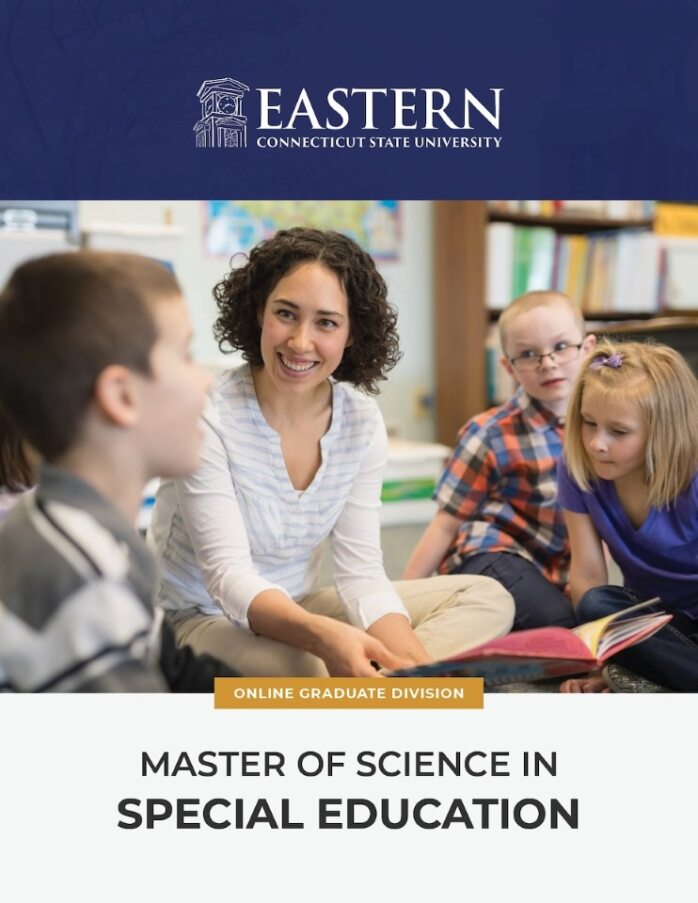The field of Special Education is a calling for professionals driven by a desire to make a profound difference in the lives of exceptional students, be it as an educator, mentor, community advocate or similar role. For educators, the personal and professional fulfillment that comes from helping students with disabilities reach their full potential is a powerful motivator for pursuing a master’s degree to better their instruction.
Special education is also a field with positions that are in demand. The U.S. Bureau of Labor Statistics (BLS) projects more than 33,500 job openings for special education teachers nationwide every year for the next decade. The demand for special education teachers is also apparent in the salaries they can make. For example, in Connecticut, special education teachers at the kindergarten and elementary school level earn a median salary of $85,610, according to state occupational data from the BLS. Special education teachers at the middle school level earn $84,620, while those at the secondary school level earn $86,790.
Whether you already work in special education or desire to transition from general education into working with those who have disabilities, you may find that enrolling in a master’s degree program can support you in your ambition to become a leader in the field.
Objectives of a Special Education Master’s Program
Identifying the student learning outcomes of a master’s in special education program is imperative to understanding possible academic and career goals and directions.
Dr. Kwangwon Lee, an assistant professor of Early Childhood Special Education and a co-coordinator of the Master of Science in Special Education program at Eastern Connecticut State University (Eastern), said the university’s graduate program uniquely prepares teachers for success in this important field.
“Through an interagency approach, we seek to prepare all students for not only working in classroom settings but also for working with related service providers (social workers, disability agencies) and families in community settings,” Dr. Lee said.
“Special education is not limited to the school and classroom setting. We expect that students will gain a unique community-based experience from our program and will gain a new understanding of how to work with a variety of professionals to meet the needs of all children with disabilities and their families.”
The following are some of the specific outcomes Eastern expects students to reach upon program completion:
- Demonstrate foundational knowledge in special education, including laws and policies, professional standards, learner characteristics, planning for varying learning environments, instruction, and professional responsibilities towards students with mild to moderate disabilities.
- Apply knowledge about diagnoses, planning and placement teams, referral processes, and appropriate teaching frameworks, including Response to Intervention (RtI), also known as Scientific Research-Based Intervention (SRBI) in Connecticut, Positive Behavior Intervention Support (PBIS), and Universal Design for Learning (UDL).
- Apply theories and approaches to assessment to analyze individual and group data, and to plan for content-based interventions for students with learning disabilities, exceptional learning needs, and from culturally or linguistically diverse backgrounds.
- Explore the use of art therapy in educational settings and develop individual and group therapy-based interventions that incorporate play, music and the visual arts.
- Analyze evidence-based behavior management practices, interagency collaborations and build inclusive communities for individuals with disabilities.
- Demonstrate an ability to plan, implement, and support students with disabilities in diverse settings, demonstrate culturally responsive practices, and the ability to collaborate on professional partnerships.
At Eastern, the student learning outcomes of the M.S. in Special Education program also prepare students for Connecticut’s K-12 Special Education cross-endorsement, should they seek it*.

Earn an M.S. In Special Education
Embark on a transformative journey with an online M.S. in Special Education. Hone expertise, empower students, and open doors to impactful careers. Start your academic journey today.
Who Benefits from a Master’s in Special Education?
Most professionals who pursue a master’s in special education program are active and experienced educators seeking to enhance their competencies with advanced skills in evidence-based approaches. Many are licensed by their respective states to work with exceptional students in a variety of settings, ranging from Early Childhood Education to Secondary Education.
If they’re not already in special education, many are general education teachers who have an interest in special education to support students in their current roles as general education teachers or are seeking cross-endorsement to become a special education teacher in their state.
Eastern’s M.S. in Special Education offers 100% online coursework that allows busy teachers to maintain their professional and personal responsibilities. Most can complete the program in 18 months.
*Upon successful completion of the M.S. in Special Education and the certification tests (Connecticut Foundations of Reading Test 090 and Praxis II, Special Education: Core Knowledge and Mild to Moderate Applications 5543), candidates may apply to the state to cross-endorse to Comprehensive Special Education, K-12 (165).
National long-term projections may not reflect local and/or short-term economic or job conditions, and do not guarantee actual job growth. The information provided is not intended to represent a complete list of hiring companies or job titles, and degree program options do not guarantee career or salary outcomes. Students should conduct independent research for specific employment information.
By completing this form and clicking the button below, I consent to receiving calls, text messages and/or emails from BISK, its client institutions, and their representatives regarding educational services and programs. I understand calls and texts may be directed to the number I provide using automatic dialing technology. I understand that this consent is not required to purchase goods or services.
If you would like more information relating to how we may use your data, please review our Privacy Policy.





